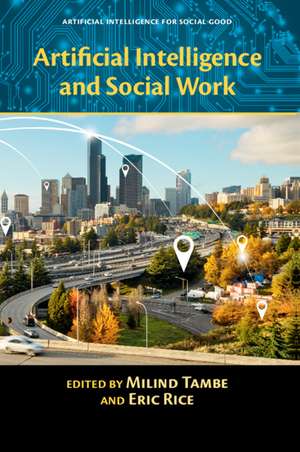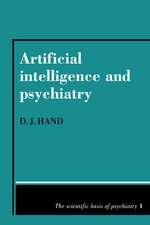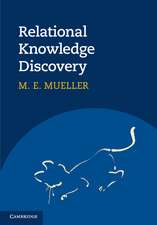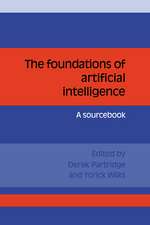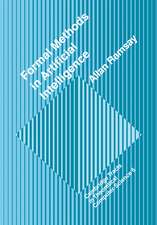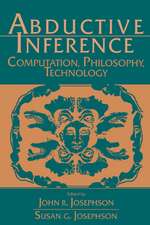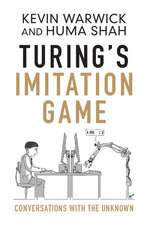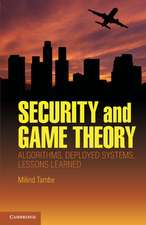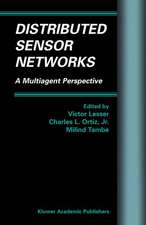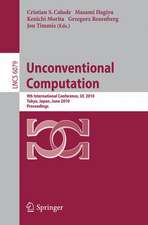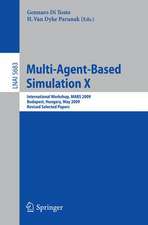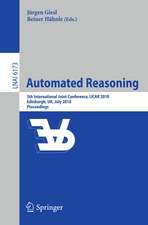Artificial Intelligence and Social Work: Artificial Intelligence for Social Good
Editat de Milind Tambe, Eric Riceen Limba Engleză Paperback – 10 feb 2021
| Toate formatele și edițiile | Preț | Express |
|---|---|---|
| Paperback (1) | 265.76 lei 43-57 zile | |
| Cambridge University Press – 10 feb 2021 | 265.76 lei 43-57 zile | |
| Hardback (1) | 801.42 lei 43-57 zile | |
| Cambridge University Press – 28 noi 2018 | 801.42 lei 43-57 zile |
Preț: 265.76 lei
Preț vechi: 332.19 lei
-20% Nou
Puncte Express: 399
Preț estimativ în valută:
50.86€ • 52.83$ • 42.25£
50.86€ • 52.83$ • 42.25£
Carte tipărită la comandă
Livrare economică 03-17 februarie 25
Preluare comenzi: 021 569.72.76
Specificații
ISBN-13: 9781108444347
ISBN-10: 1108444342
Pagini: 267
Dimensiuni: 152 x 229 x 16 mm
Greutate: 0.4 kg
Editura: Cambridge University Press
Colecția Cambridge University Press
Seria Artificial Intelligence for Social Good
Locul publicării:New York, United States
ISBN-10: 1108444342
Pagini: 267
Dimensiuni: 152 x 229 x 16 mm
Greutate: 0.4 kg
Editura: Cambridge University Press
Colecția Cambridge University Press
Seria Artificial Intelligence for Social Good
Locul publicării:New York, United States
Cuprins
Part I: 1. Artificial intelligence and social work Eric Rice and Milind Tambe; 2. The causes and consequences of youth homelessness Eric Rice and Hailey Winetrobe; 3. Using social networks to raise HIV awareness among homeless youth Amulya Yadav, Bryan Wilder, Hau Chan, Albert Jiang, Haifeng Xu, Eric Rice and Milind Tambe; 4. Influence maximization in the field Amulya Yadav, Bryan Wilder, Eric Rice, Robin Petering, Jaih Craddock, Amanda Yoshioka-Maxwell, Mary Hemler, Laura Onasch-Vera, Milind Tambe and Darlene Woo; 5. Influence maximization with unknown network structure Bryan Wilder, Nicole Immorlica, Eric Rice and Milind Tambe; Part II: 6. Maximizing the spread of sexual health information in a multimodal communication network of young black women Elizabeth Bondi, Jaih Craddock, Rebecca Funke, Chloe Legendre and Vivek Tiwari; 7. Minimizing violence in homeless youth Ajitesh Srivastava, Robin Petering and Michail Misyrlis; 8. Artificial intelligence for improving access to sexual health necessities for youth experiencing homelessness Aida Rahmattalabi, Laura Onasch-Vera, Orlando Roybal, Kien Nguyen, Luan Tran and Robin Petering; 9. Know-stress Subhasree Sengupta, Kexin Yu and Behnam Zahiri; 10. A multidisciplinary study on the relationship between foster care attributes and posttraumatic stress disorder symptoms in foster youth Amanda Yoshioka-Maxwell, Shahrzad Gholami, Emily Sheng, Mary Hemler, Tanachat Nilanon and Ali Jalal-Kamali; 11. Artificial intelligence to predict intimate partner violence perpetration Robin Petering, Mee-Young Um, Nazanin Alipourfard, Nazgol Tavabi, Rajni Kumari and Setareh Nasihati Gilani; 12. SHIHbot Joshua Rusow, Jacqueline Brixey, Rens Hoegen, Lan Wei, Karan Singla and Xusen Yin; 13. Ethics and artificial intelligence in public health social work David Gray Grant.
Recenzii
'Tambe and Rice have created a novel collaboration which brings together computer science and social work researchers to address seemingly intractable social challenges. The variety of problems described in the collection on which cross-disciplinary teams have already made progress makes evident the promise of this new type of collaboration. The final chapter's thoughtful consideration of the ethical issues such work raises is a model for taking ethics into account from the start of designing artificial intelligence systems.' Barbara Grosz, Harvard University, Massachusetts
'This book frankly acknowledges both striking creative possibility as well striking inequalities, unmet need and devastating consequences in today's complex society. More than ever we need capacity to think, create, and problem solve in innovative ways: to leverage our technological and social tools toward more nimbly dissipating seemingly intractable social problems. This collection offers a bold vision in this regard, demonstrating what unanticipated partners - social work scientists and computer scientists - can accomplish. It provides valuable guidance highly relevant not only for these two sets of scholars and field partners, but what multiple disciplines and stakeholders can work toward. Rather than remaining in initial levels of aspirational ideas, these authors provide a panoply of concrete, detailed, and accessible innovations that move to operationalize AI for social good. Kudos, colleagues!' Paula S. Nurius, University of Washington
'The time has come for social work to engage deeply with those from computer science, data science, and engineering to work towards greater social good. This book boldly claims that space. Tambe and Rice bring the power of artificial intelligence to social work in a way that is engaging and easy to understand. Their inclusion of real world examples shows the reader how this can be done. Bravo for helping bridge the gap between these fields in an effort to improve the world.' Stephanie Cosner Berzin, Simmons University, Massachusetts
'This book frankly acknowledges both striking creative possibility as well striking inequalities, unmet need and devastating consequences in today's complex society. More than ever we need capacity to think, create, and problem solve in innovative ways: to leverage our technological and social tools toward more nimbly dissipating seemingly intractable social problems. This collection offers a bold vision in this regard, demonstrating what unanticipated partners - social work scientists and computer scientists - can accomplish. It provides valuable guidance highly relevant not only for these two sets of scholars and field partners, but what multiple disciplines and stakeholders can work toward. Rather than remaining in initial levels of aspirational ideas, these authors provide a panoply of concrete, detailed, and accessible innovations that move to operationalize AI for social good. Kudos, colleagues!' Paula S. Nurius, University of Washington
'The time has come for social work to engage deeply with those from computer science, data science, and engineering to work towards greater social good. This book boldly claims that space. Tambe and Rice bring the power of artificial intelligence to social work in a way that is engaging and easy to understand. Their inclusion of real world examples shows the reader how this can be done. Bravo for helping bridge the gap between these fields in an effort to improve the world.' Stephanie Cosner Berzin, Simmons University, Massachusetts
Descriere
An introductory guide with real-life examples on using AI to help homeless youth, diabetes patients, and other social welfare interventions.
